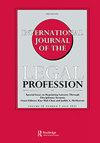2023年第1期编辑
IF 0.9
Q2 LAW
International Journal of the Legal Profession
Pub Date : 2023-01-02
DOI:10.1080/09695958.2023.2214779
引用次数: 0
摘要
Buschor以一项关于德国、奥地利和瑞士律师事务所管理合伙人的研究拉开了今年的序幕。确定了管理合作伙伴的15个不同角色,为进一步研究开辟了领域。治理结构得到了解决,在他们的角色中发现了相对大量的行政任务和个人关切。科利尔等人研究了英国退伍军人寻求法律帮助的行为,发现他们越是拖延寻求帮助,获得有用帮助的可能性就越小。他们还指出,拖延与这些合法客户的军人身份有关。Tsereteli提出了一个经过充分研究的案例研究,探讨非正规性在司法招聘系统中的作用如何使变革看起来存在于纸面上,但在实践中却不存在。格鲁吉亚后共产主义时期的司法机构显示了管理从律师基地招聘司法人员的正式规则和非正式规则之间的复杂关系;以及权力是如何容易被滥用的。Dehaghani和Newman将Galanter(1973)关于重复球员和一人制球员的概念带入了威尔士刑事辩护律师的世界。这样的分类对客户或律师有帮助吗?律师应该为每一种分类做些什么?二元假设被发现在治疗和注意力方面没有用处。Smith(2013)的方法被认为是评估辩护律师对被告的行为参与以及交易中的超然和保密性的最合适的方法。Pivaty(2019)区分律师角色的严格法律和情感方面的类型学也很有帮助。Winczorek关注波兰中小企业的法律服务。Winczorek展示了中小企业在国际上的重要性,这些企业具有中等复杂性和高度脆弱性。会计师似乎比律师更能帮助中小企业解决“法律”问题。法律服务的使用模式是使用司法之路模式制定的(Genn(1999))。制定“代客、管家和管家”的家庭类任务是为了展示中小企业使用律师协助的方式——只有从合理的立场出发,才能提供有用的商业回报。本文章由计算机程序翻译,如有差异,请以英文原文为准。
Editorial Issue 1 2023
Buschor opens the year with a study of managing partners in law firms in Germany, Austria and Switzerland. 15 distinct roles for managing partners are identified, opening the field for further research. Governance structures are addressed and a relatively large number of administrative tasks and personal concerns are found in their roles. Collier et al look at legal help-seeking behaviour among British military veterans, showing that the more they delay in seeking help, the fewer possibilities there are for useful assistance. They also note that delay is associated with military identity in these legal clients. Tsereteli presents a well-researched case study on how the role of informality in systems of judicial recruitment allows change to appear to exist on paper but not in practice. The post-communist judiciary in Georgia shows the complex relationship between formal and informal rules governing judicial recruitment from a lawyer base; and how power is easily abused. Dehagahani and Newman take Galanter’s (1973) concept of repeat players and oneshotters into the world of criminal defence lawyers in Wales. Is such a categorisation helpful to the client or to the lawyer and what should the lawyer do for each? The binary assumption was found not to be useful in terms of treatment and attention. Smith’s (2013) approach was considered to be the most appropriate in terms of assessing the defence lawyer’s behaviourpartisanship for the accused, as well as detachment and confidentiality in dealings. Pivaty’s (2019) typology differentiating the strictly legal and the affective aspects of the lawyer’s role was also helpful. Winczorek looks at legal services for small and medium-sized enterprises in Poland. Winczorek shows the importance of SMEs internationally, entities of moderate complexity and high vulnerability. Accountants seem to help SMEs with their “legal” problems more than lawyers. Patterns of legal service use are developed using the Paths to Justice model (Genn (1999)). The domestic type tasks of “valet, butler and housekeeper” are developed to show the ways in which SMEs use lawyer assistance -only from a rational stance where it provides a useful business return.
求助全文
通过发布文献求助,成功后即可免费获取论文全文。
去求助

 求助内容:
求助内容: 应助结果提醒方式:
应助结果提醒方式:


